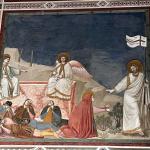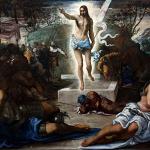Girard has tpyically provocative and stimulating things to say about Troilus & Cressida (in Theater of Envy ).
1) He focuses attention on Pandarus as a representative of ?desire made man.?EHis business is to inflame Troilus and Cressida to love, which he does through exaggerated praise of the one to the other. Yet, ?in the midst of this predictable discourse, from time to time Pandarus resorts to an equally banal but much more effective trick. He tries to turn the famous Helen into a mediator of the desire he wants to arouse.?EHe points to 1.2.107-8, 118, where Pandarus tries to convince Cressida that Helen is secretly in love with Troilus. This, he argues, is the true incentive behind the affair, for ?neither Pandarus nor Cressida pay the slightest attention to any genuine quality in Troilus that would make him intrinsically worthy of love.?E(The discussion of worth/value is again in the background.) Pandarus is thus the ?patron saint?Eof modern advertising, and Shakespeare is its ?prophet?E ?His Pandarus dangles in front of his prospective customers the prestigious desire that will arouse their own. The most potent drug, the number one pharmakon, is this mimetic titillation, this powerful intimation of sexiness and fashionableness provided by Helen.?E
2) Girard makes the interesting point that, medieval though her story is, Cressida?s history is ?a duplicate of the genuinely Homeric story, which, in addition to the rivalry of the Greeks and Trojans, is full of rivalry among the Greeks themselves ?Enamely the rivalry of Agamemnon and Achilles over a beautiful captive, Briseis.?E
3) He perceptively notes that the Trojan War according to Shakespeare as become ?some kind of permanent tournament fought primarily for vanity and personal prestige.?E
4) Troilus and Cressida are certainly aware of Pandarus?Emachinations, but they think he is simply an instrument for them to fulfill desires aroused in them without his aid. Girard suggests that in this they are deceived. Pandarus is not merely the agent for their consummation, but midwife of their desire itself.
5) The morning after Troilus is eager to leave, Girard thinks because he wants to bathe in the honor of his buddies, who will congratulate him on his conquest. Echoes of Ulysses?Eclaim that a man?s honor comes only by reflection, and again worth/value is a key issue. For the hero, the question is, What value is a night of sex if you can?t boast about it in the morning, if you can?t ride a wave of mimetic desire?
6) For Girard, Shakespeare is overturning the misogynist medieval tellings of the tale. Instead of placing blame exclusively on Cressida?s unfaithfulness, he shows Troilus turning indifferent (once lust is satisfied), and even joining Pandarus in making sexual jokes at Cressida?s expense. A courtly lover like Troilus can only be happy when he?s indulging his unfulfilled desire; and so he accepts Cressida?s departure stoically and even a bit gladly. He is eventually aroused to passion again only when Cressida is removed from him and especially while witnessing Diomedes?Eseduction, which (mimetically of course) again rouses his desire. Cressida is right from the beginning: Men are passionate until they achieve a woman, and then discard them. In love as in war, ?Time has a wallet at his back.?E















